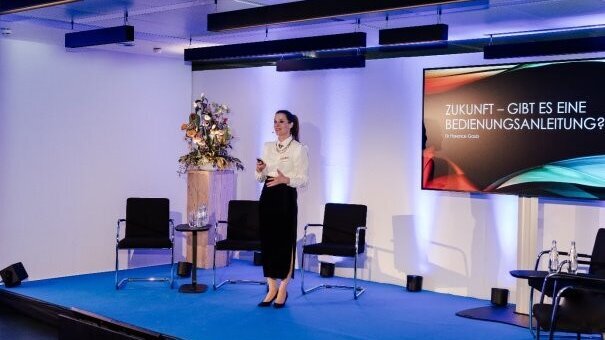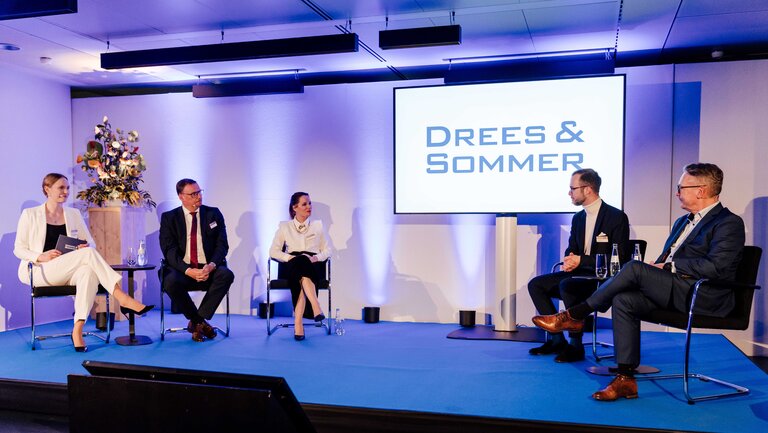The world we want to live in tomorrow must be built and shaped by us today: there is hardly any other sector where this is as evident as in the construction and real estate industry. Real estate at the planning stage today will shape and influence the everyday lives and scope for action of many people for decades. Even now, we can actively exert influence on what happens to construction materials at the end of their useful life. How we can now plan our future with optimism and 'get things done’ pragmatically was the theme of a panel discussion between futurologist Florence Gaub, Carsten Wesselmann, chief economist at Kreissparkasse Cologne, and industry experts at Drees & Sommer’s event entitled Zukunft aktiv gestalten (‘Actively shaping the future’) in Cologne yesterday.
Is there another storm looming on the horizon? Many people are asking themselves this question at this time. Faced with climate change, war and inflation, many people are currently finding it difficult to get out of acute crisis management mode and be confident. “A certain fatalism has become entrenched in the debate within society," said Florence Gaub, summarizing the current mood. The futurologist, political scientist and head of the research department of the NATO Defense College in Rome sees a catastrophe-dominated mindset itself as a major threat to our future: “We are not doing ourselves any favors by thinking in this way. This is because it is often this dispirited and pessimistic thinking and the associated paralysis that ultimately lead to disaster.” It makes more sense to be clear that: "Our future is not predetermined. Every individual has the option of exerting influence and taking action," explained the expert. So the crucial question that everyone should ask themselves is: “What levers can I pull at this time, what path can I take, to work towards a positive future?”
The Built Future: Construction Industry as a Driver of Transformation
Futurologist Gaub, economist Carsten Wesselmann and experts from the planning and consulting firm Drees & Sommer discussed what levers and approaches this could involve in the case of the construction and real estate industry, on the panel Zukunft aktiv gestalten – konkrete Lösungen für die Bau- und Immobilienwirtschaft (‘Actively shaping the future: practical solutions for the construction and real estate industry’) in Cologne.
This debate is taking place at a critical time. The construction and real estate industry is also now struggling to adopt a positive attitude towards the future. Optimists and pessimists paint very different pictures of what companies can expect. Is the industry, with its large carbon footprint, ultimately doomed to be a ‘climate killer’? Or can a new way of dealing with resources used in construction even do the opposite, and become a vital lever for climate-friendly economic activity? Will the proposed regulation of recycling-enabled construction in Germany and in the other European countries make economic real estate projects impossible – or will the regulation instead become a catalyst for a genuine turnaround in construction that will ultimately benefit everyone?
“The line of argument that you want to follow is ultimately a matter of attitude. We need to clarify the problems and challenges facing our industry. But we must not let them obscure our view of opportunities and the options for taking action,” commented Stefan Heselschwerdt. He is a Partner at Drees & Sommer and responsible for the company’s activities in the federal State of North Rhine-Westphalia. The ongoing debate in the industry is often too defensive for him: “We should not see ourselves as being driven by the transformation, but as active drivers and shapers of the future.”
There Are Many Solutions at Hand
In practice, this is often easier said than done, admits Drees & Sommer Partner Stefan Heselschwerdt: “On the one hand, we must not lose sight of the bigger picture. But we also have to focus on tangible innovation and cost-effectiveness in the Here and Now.“ However, many ideas and solutions are at hand according to the expert: “Revitalization instead of demolition, recycling instead of waste disposal, and a reuse-compliant design – that is what our priorities should be.“
He mentioned a few examples to back his statement. Jointly with the construction project developer Delta Development, for instance, Drees & Sommer, participated in the construction of a sustainable logistics center for a fashion company. A brownfield site of a disused mine in Germany’s Ruhr river region was rehabilitated for this purpose. The building has a positive impact on climate and water consummation in the region thanks to re-usable materials, rainwater storage tanks, a green roof and a geothermal energy supply system. All materials can be reused at the end of the useful life of the building: “If we see today’s buildings and infrastructure as tomorrow’s depositories for raw materials, this provides a new, creative impetus with regard to future-proof real estate projects,“ underlined Steffen Heselschwerdt.
There Is No Need to Wait for Regulations to Create Innovative Solutions
The German government has similar targets and not only plans to introduce of a Circularity Passport but has defined this goal in its coalition agreement. Flagship projects like the logistics center in the Ruhr river area, the timber hybrid building The Cradle in Duesseldorf or Drees & Sommer’s new office complex OWP12 in Stuttgart have many benefits: a digital Circularity Passport shows all materials used during the construction of a property. It informs about the share of renewable raw materials as well as reusable and recyclable materials, in addition to the details on construction and demolition waste. The Circularity Passport should also define the environmental impact of a building during a reference useful life period of 50 years. Furthermore, it includes details on the greenhouse gas emissions assessed within the frame of an ecological audit, and also the primary energy requirement from non-renewable energy sources.
“At this time it is also important to use new tools such as artificial intelligence boldly for specific purposes, and to exploit their potential,” pointed out Kilian Huneke, Senior Consultant at Drees & Sommer. „Artificial intelligence will play a key role and radically disrupt corporate structures. Companies that adapt quickly and seize this opportunity will remain at the top. This is why entities need competencies such as a digital mindset, positive curiosity regarding innovative technologies, readiness to change and willingness to learn,“ he added.
For Kilian Huneke , it is not a question of having the tools and technology, but a question of corporate culture when integrating AI and GenAI into the company and getting it up and running: “AI will transform our industries, make real estate smarter and revolutionize our infrastructures. It is not only about increasing efficiency or saving energy – but also about creating completely new opportunities.“ His employer Drees & Sommer is a pioneer and innovation leader. The company has identified the potential of AI and implemented it at an early stage. “A strategy is in place for AI. We take part in the Microsoft Early Acce Program for the copilot system. We have participated in an ideathon, and we are developing a corporate in-house DresoGPT. There are many opportunities for the use of AI we currently work on.“
The Economist Would Like to See More Confidence on the Part of the Real Estate Sector
Carsten Wesselmann, chief economist at Kreissparkasse Cologne and professor of economics at Fresenius University of Applied Sciences would also like to see more confidence and creativity on the part of the real estate sector: “The macroeconomic importance of the construction and real estate industry is huge – so it has correspondingly large leverage to steer the transformation of the economy and society in one direction or another.“
Innovative solutions, concrete pilot projects, positive visions of the future: futurologist Florence Gaub summarizes the most important finding for the industry by saying that it has a lot of opportunities and enormous influence on the economy and society. This is where we need to focus, she continued: “It is not about naïve optimism, but about believing that we can shape the future."

